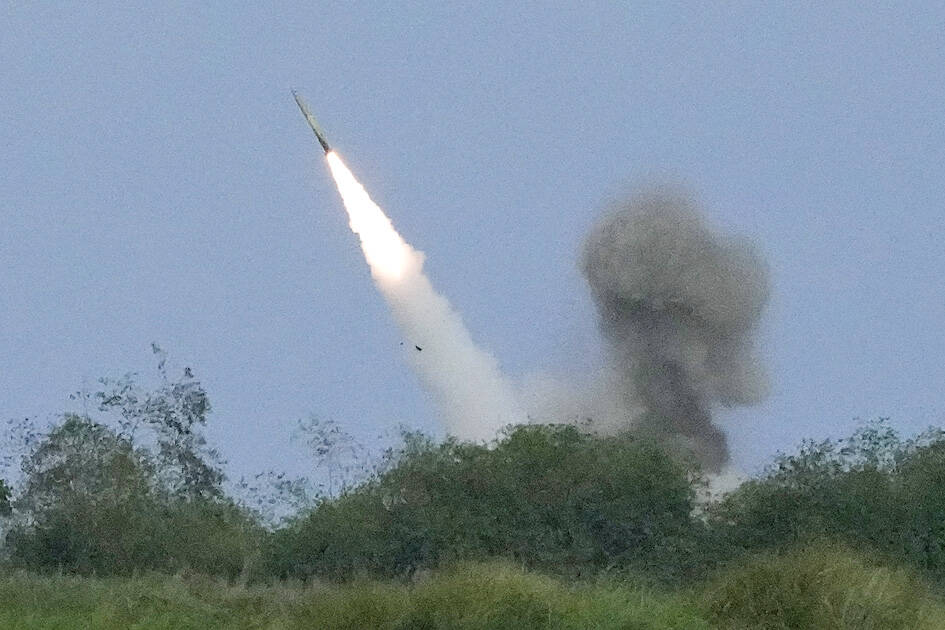The US is to deliver High Mobility Artillery Rocket Systems (HIMARS) to Taiwan a year ahead of schedule, in 2026, with the delivery being expedited in response to rising military tensions across the Strait, the Ministry of National Defense said.
Taiwan agreed to buy 29 HIMARS worth NT$32.5 billion (US$1.06 billion), including an initial order of 11 systems and an additional 18 to replace 40 M109A6 self-propelled howitzers, Lee Shih-Chiang (李世強), director of the ministry’s Department of Strategic Planning, told lawmakers on Thursday.
The first 11 systems are on sechedule, to be delivered next year or in 2025, while the additional 18 are to arrive in 2026, ahead of the planned 2027 or 2028 delivery, Lee said.

Photo: AP
The army’s procurement of rocket artillery systems and ammunition additionally includes 84 Army Tactical Missile Systems (ATACMs) with a nominal range of 300km and 864 Guided Multiple Launch Rocket Systems (GMLRS), with a nominal effective range of 42km, he said.
Separately, retired admiral Huang Shu-kuang (黃曙光), convener of the Presidential Office’s indigenous submarine task force, said yesterday that the nation is on track to put the first indigenous submarine to sea in September.
He made the remark at a National Taiwan Ocean University event discussing the nation’s shipbuilding programs.
Submarines are crucial for Taiwanese security, as the nation’s geostrategic position on the first island chain is better suited for a defensive posture based on submarine warfare than strength-on-strength surface action, Huang said.
The nation’s security strategy should involve improving the capability of the armed forces and banding with other democratic nations to form a defensive alliance in the Indo-Pacific region, he said.
Taiwan began efforts to obtain submarines under former president Lee Teng-hui’s (李登輝) administration, but the first attempts were unsuccessful due to diplomatic constraints, Huang said.
The indigenous defense submarine program was proposed near the end of former president Ma Ying-jeou’s (馬英九) term and continued by President Tsai Ing-wen (蔡英文), he said.
Precision strike missiles, submarines, undersea vessels, missile-firing boats, and mines and minelayers must be developed to defend the maritime logistical lifelines the nation depends on for gas and strategic resources, Huang said.
The university is at the forefront of the nation’s bid to develop AI-based autonomous uncrewed undersea vessels, and a prototype has successfully completed an one-hour undersea voyage, university president Cheng Ying-yao (鄭英耀) said.

CHAOS: Iranians took to the streets playing celebratory music after reports of Khamenei’s death on Saturday, while mourners also gathered in Tehran yesterday Iranian Supreme Leader Ayatollah Ali Khamenei was killed in a major attack on Iran launched by Israel and the US, throwing the future of the Islamic republic into doubt and raising the risk of regional instability. Iranian state television and the state-run IRNA news agency announced the 86-year-old’s death early yesterday. US President Donald Trump said it gave Iranians their “greatest chance” to “take back” their country. The announcements came after a joint US and Israeli aerial bombardment that targeted Iranian military and governmental sites. Trump said the “heavy and pinpoint bombing” would continue through the week or as long

TRUST: The KMT said it respected the US’ timing and considerations, and hoped it would continue to honor its commitments to helping Taiwan bolster its defenses and deterrence US President Donald Trump is delaying a multibillion-dollar arms sale to Taiwan to ensure his visit to Beijing is successful, a New York Times report said. The weapons sales package has stalled in the US Department of State, the report said, citing US officials it did not identify. The White House has told agencies not to push forward ahead of Trump’s meeting with Chinese President Xi Jinping (習近平), it said. The two last month held a phone call to discuss trade and geopolitical flashpoints ahead of the summit. Xi raised the Taiwan issue and urged the US to handle arms sales to

State-run CPC Corp, Taiwan (CPC, 台灣中油) yesterday said that it had confirmed on Saturday night with its liquefied natural gas (LNG) and crude oil suppliers that shipments are proceeding as scheduled and that domestic supplies remain unaffected. The CPC yesterday announced the gasoline and diesel prices will rise by NT$0.2 and NT$0.4 per liter, respectively, starting Monday, citing Middle East tensions and blizzards in the eastern United States. CPC also iterated it has been reducing the proportion of crude oil imports from the Middle East and diversifying its supply sources in the past few years in response to geopolitical risks, expanding

Pro-democracy media tycoon Jimmy Lai’s (黎智英) fraud conviction and prison sentence were yesterday overturned by a Hong Kong court, in a surprise legal decision that comes soon after Lai was jailed for 20 years on a separate national security charge. Judges Jeremy Poon (潘兆初), Anthea Pang (彭寶琴) and Derek Pang (彭偉昌) said in the judgement that they allowed the appeal from Lai, and another defendant in the case, to proceed, as a lower court judge had “erred.” “The Court of Appeal gave them leave to appeal against their conviction, allowed their appeals, quashed the convictions and set aside the sentences,” the judges